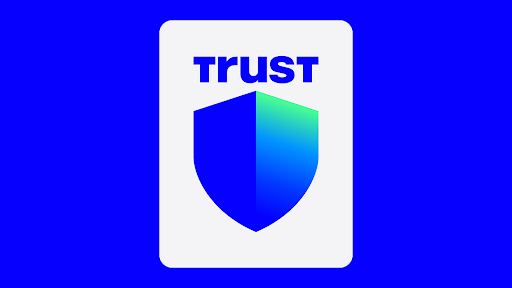So, I was thinking about how many crypto wallets I’ve actually used over the years—and honestly, the experience can be all over the place. Some feel clunky, others just don’t quite nail the balance between security and convenience. Wow! It’s surprising how often wallets claim to be “secure” but leave you second-guessing every transaction. For mobile users especially, the challenge is real: finding a crypto wallet that’s both trustworthy and easy on the eyes (and fingers).
Here’s the thing. When I first downloaded trust wallet, I was skeptical. Too many apps promise security but don’t deliver. My gut said, “Okay, this might just be another flashy app.” But after diving in, the experience was different. The simple interface combined with solid encryption made me pause and rethink what a mobile wallet should be.
Seriously? Yeah. Initially, I thought all wallets were basically the same underneath. But then I realized the devil’s in the details—like how they handle private keys, backups, and multi-coin support. Trust Wallet, for example, nails this with a user-friendly approach that doesn’t compromise on fundamental security principles.
What bugs me sometimes is when wallets act like they’re “one size fits all,” but they really aren’t. Some cater to hardcore traders, others to newbies, but Trust Wallet somehow bridges that gap. Hmm… it’s not perfect, but for a mobile-first user looking to store multiple cryptocurrencies safely, it’s very very important to have something that just works smoothly.
Okay, so check this out—Trust Wallet supports a wide range of coins and tokens, which means you don’t need to juggle multiple apps to manage your portfolio. That’s a huge plus for anyone who’s tired of switching between apps and wallets. It feels like finally someone got the memo about real user needs.
One thing I really appreciate is how Trust Wallet never asks you to hand over your private keys. I mean, that’s crypto 101, right? But you’d be surprised how many wallets get this wrong or bury it in fine print. With Trust Wallet, your keys stay on your device, encrypted and safe. On one hand, this means you’re in full control, but on the other, it also means if you lose your phone and backup phrase, well… you’re kinda out of luck. So yeah, make sure you write down your recovery phrase somewhere safe. Seriously, do that.
Also, the integration with decentralized apps (dApps) blew me away. I wasn’t expecting to browse and interact with dApps directly from my phone without jumping through hoops. That’s a big deal because it opens up a world of DeFi, NFT marketplaces, and more, right at your fingertips. It’s not just about holding crypto anymore; it’s about doing stuff with it.
By the way, I have to admit—I’m biased toward mobile solutions. Desktop wallets feel like they belong in a different era. Life’s busy, and I don’t want to be tethered to my laptop to manage my digital assets. Trust Wallet caters perfectly to those who want security and flexibility on the go. (Oh, and by the way, the UI is clean enough that even my mom could probably figure it out.)
But here’s a thought that crossed my mind: no system is bulletproof. Even the best wallets can be vulnerable if users aren’t cautious. Phishing attacks, fake apps, and sloppy recovery phrase storage can all cause trouble. That’s why it’s so crucial to download Trust Wallet only from official sources to avoid scams. I found the official site here, and it’s definitely the safest bet to get the legit app.

Now, a little story—once, I accidentally downloaded a fake wallet app that looked almost identical to Trust Wallet. My heart raced when I realized it didn’t ask for my recovery phrase upfront, which felt off. Something felt off about the permissions it requested too. That experience made me appreciate how Trust Wallet’s straightforward design doesn’t try to sneak anything in. It’s honest, and that counts for a lot in crypto.
Okay, so diving deeper, the wallet’s open-source nature also earns it some serious trust points. Developers and users can audit the code to verify security claims, which isn’t something every wallet offers. This transparency adds a layer of confidence that’s hard to quantify but easy to feel.
Something else worth mentioning is the wallet’s support for staking. Yeah, you can actually earn passive income by staking coins directly within the app. It’s a neat feature for those who want their crypto to work harder without juggling multiple platforms. I’m not 100% sure how the rewards compare across different coins, but having the option built-in is a big convenience.
One minor quirk (and I mean tiny) is that sometimes the app can feel a bit slow when syncing all your tokens, especially if you’re tracking a large portfolio. Not a dealbreaker, but noticeable. Hopefully, future updates will iron that out.
Security Features That Make a Difference
Let me walk you through what really makes a wallet “secure” in my book. First, it’s all about control—you need to hold your own keys. Trust Wallet delivers on that front without complicating the user experience. Then, it’s about encryption and biometric locks, which the wallet supports nicely. Face ID and fingerprint scanning aren’t just fancy add-ons; they’re layers that protect you from casual intrusions.
Another thing that’s often overlooked is open communication about vulnerabilities. Trust Wallet has a bug bounty program, meaning they actively encourage researchers to find and report issues. That proactive stance is refreshing in an industry where silence sometimes reigns.
Now, some folks argue that hardware wallets are always safer than software wallets, and on paper, they’re right. But for everyday use on a mobile device, Trust Wallet strikes a solid balance. It’s not perfect, but it’s practical and secure enough for most users who don’t want to deal with the fuss of hardware devices.
Here’s a wild thought: I remember when I first started in crypto, the jargon was intimidating. Wallets talked about “seed phrases” and “keys” like it was rocket science. Trust Wallet’s approach simplifies the language without dumbing it down. That’s a subtle but very very important factor for adoption.
Anyway, I guess the takeaway here is that not every wallet fits every need, but for mobile users craving security, ease, and multi-coin support, Trust Wallet should be on your radar. Just remember, no wallet will save you from dumb mistakes like losing your backup phrase or falling for phishing scams.
Common Questions About Trust Wallet
Is Trust Wallet really safe for beginners?
Absolutely. Its straightforward design and in-app guidance make it accessible, but users still need to understand the importance of securing their recovery phrases.
Can I store all my cryptocurrencies in one place with Trust Wallet?
Yes, Trust Wallet supports a wide range of coins and tokens across multiple blockchains, so you can manage your portfolio without hopping between apps.
What happens if I lose my phone?
If you’ve safely backed up your recovery phrase, you can restore access on a new device. Without it, unfortunately, your funds are likely lost.
Does Trust Wallet charge fees?
The app itself is free, but standard network fees apply when sending transactions. No hidden charges from the wallet provider.
So yeah, to circle back—while I started off a bit skeptical, Trust Wallet has proven itself as a solid mobile crypto wallet choice. It’s not without flaws, but the blend of security, usability, and multi-asset support makes it a standout in a crowded field. If you’re on the hunt for a wallet that feels trustworthy yet approachable, give it a look. Just don’t forget to protect your recovery phrase; that’s your lifeline.










